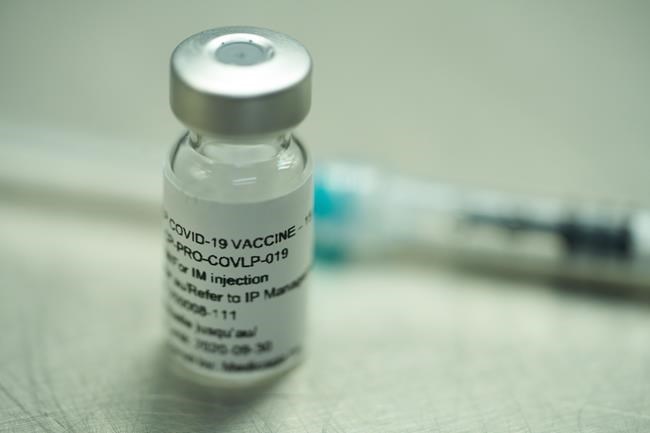OTTAWA — saąúĽĘ´«Ă˝ is urging the World Health Organization not to reject the only Canadian-made COVID-19 vaccine, so it can be donated and used by the COVAX vaccine-sharing alliance.
But saąúĽĘ´«Ă˝ hasn't even donated half of the vaccine doses it already promised to make available from its own supplies, and International Development Minister Harjit Sajjan said it's not the availability of doses getting in the way.
Following a trip last week to Senegal and Ghana for meetings with local officials on COVID-19 vaccination efforts, Sajjan said the limiting factor to saąúĽĘ´«Ă˝'s donations is on the receiving end.
"I know there's a discussion, obviously, right now, inside saąúĽĘ´«Ă˝ about getting doses," he said in an interview Monday.
"That discussion is very different for the people in the countries. It's not about supply, it's about making sure that they have all they need to be able to absorb the vaccines."
The World Health Organization reported last week that 714 million doses had been received in African nations, and 435 million used.
Education campaigns to overcome vaccine hesitancy, and efforts to get vaccines to remote areas or conflict zones, have been far more complicated than in saąúĽĘ´«Ă˝, Sajjan said. Addressing those issues was central to his meetings in Africa.
saąúĽĘ´«Ă˝ signed contracts with seven vaccine makers in 2020 before any vaccines were through clinical trials, betting on seven candidates they expected would be successful. That plan meant saąúĽĘ´«Ă˝ was prepaying for more than 200 million doses for a population of 38 million people. It promised to donate any excess doses it did not need.
That plan ultimately meant that within six months of the first vaccine being approved globally, two-thirds of Canadians had at least one dose, and at the one-year mark, three in four Canadians were fully vaccinated.Â
But in Africa, as of March 20, only one in five people had received their first dose, and fewer than one in seven had two. Comparatively at this point, almost half of all Canadians have now had a third dose.
Most African nations are depending on donated doses from COVAX to fulfil their orders, but deliveries in 2021 were slower than hoped because the world's supply was gobbled up by wealthier nations.
Supplies are becoming easier this year, and COVAX has now shipped almost 1.4 billion doses, but saąúĽĘ´«Ă˝'s donations are still moving slowly.
saąúĽĘ´«Ă˝ has promised to donate at least 200 million doses to COVAX by the end of this year. Thus far 37 million actual doses of Oxford-AstraZeneca, Moderna and Johnson & Johnson vaccines have been promised, along with more than $500 million in cash for COVAX to buy doses elsewhere.
But to date, saąúĽĘ´«Ă˝ has shipped only 14.9 million doses.
Adam Houston, medical policy and advocacy officer at Doctors Without Borders saąúĽĘ´«Ă˝, said it's puzzling why saąúĽĘ´«Ă˝ hasn't committed to donating any doses of Novavax's vaccine, which the WHO authorized in December and Health saąúĽĘ´«Ă˝ in February.
saąúĽĘ´«Ă˝ prepaid for 52 million doses of Novavax, but there is no sign that many will be used or needed in saąúĽĘ´«Ă˝, nor any sign that saąúĽĘ´«Ă˝ is promising to get those doses into countries that need them.
"I'm baffled by it, honestly," said Houston. "There is no possible way we would use all of those doses."
Medicago, the only plant-based vaccine for COVID-19, could add another 20 million doses to saąúĽĘ´«Ă˝'s donation pile, but only if it gets authorized by the World Health Organization.
Last week the WHO said that was unlikely because of a strict policy against engaging with tobacco companies. Medicago is based in Quebec but is partially owned by Philip Morris International.
Sajjan said every good and safe vaccine is needed.
"It definitely should be approved," he said. "We should have all options on the table."
He said as soon as countries indicate they are ready for vaccines, saąúĽĘ´«Ă˝ will move to send them doses.
"I can assure you, that this is not about us holding back any vaccines. In fact, this is about moving vaccine quickly as possible."
This report by The Canadian Press was first published March 21, 2022.
Mia Rabson, The Canadian Press



